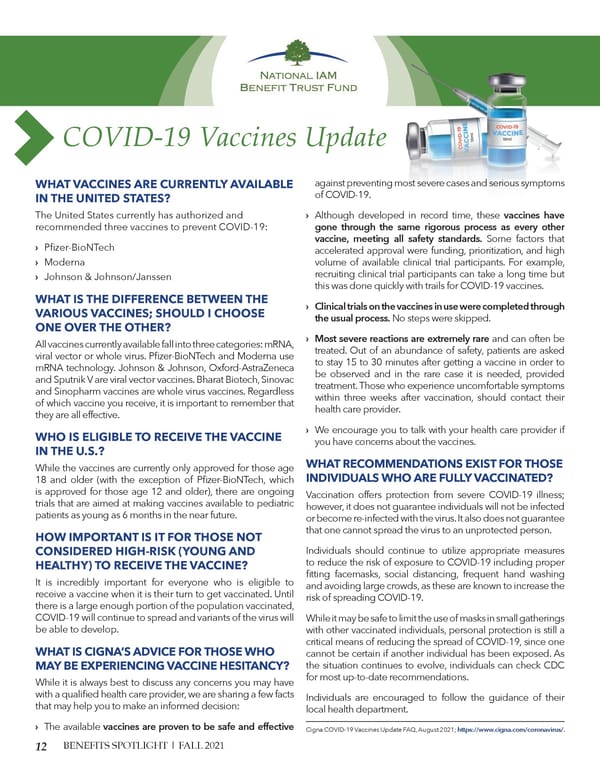12 BENEFITS SPOTLIGHT | FALL 2021 COVID-19 Vaccines Update WHAT VACCINES ARE CURRENTLY AVAILABLE IN THE UNITED STATES? The United States currently has authorized and recommended three vaccines to prevent COVID-19: › Pfizer-BioNTech › Moderna › Johnson & Johnson/Janssen WHAT IS THE DIFFERENCE BETWEEN THE VARIOUS VACCINES; SHOULD I CHOOSE ONE OVER THE OTHER? All vaccines currently available fall into three categories: mRNA, viral vector or whole virus. Pfizer-BioNTech and Moderna use mRNA technology. Johnson & Johnson, Oxford-AstraZeneca and Sputnik V are viral vector vaccines. Bharat Biotech, Sinovac and Sinopharm vaccines are whole virus vaccines. Regardless of which vaccine you receive, it is important to remember that they are all effective. WHO IS ELIGIBLE TO RECEIVE THE VACCINE IN THE U.S.? While the vaccines are currently only approved for those age 18 and older (with the exception of Pfizer-BioNTech, which is approved for those age 12 and older), there are ongoing trials that are aimed at making vaccines available to pediatric patients as young as 6 months in the near future. HOW IMPORTANT IS IT FOR THOSE NOT CONSIDERED HIGH-RISK (YOUNG AND HEALTHY) TO RECEIVE THE VACCINE? It is incredibly important for everyone who is eligible to receive a vaccine when it is their turn to get vaccinated. Until there is a large enough portion of the population vaccinated, COVID-19 will continue to spread and variants of the virus will be able to develop. WHAT IS CIGNA’S ADVICE FOR THOSE WHO MAY BE EXPERIENCING VACCINE HESITANCY? While it is always best to discuss any concerns you may have with a qualified health care provider, we are sharing a few facts that may help you to make an informed decision: › The available vaccines are proven to be safe and effective against preventing most severe cases and serious symptoms of COVID-19. › Although developed in record time, these vaccines have gone through the same rigorous process as every other vaccine, meeting all safety standards. Some factors that accelerated approval were funding, prioritization, and high volume of available clinical trial participants. For example, recruiting clinical trial participants can take a long time but this was done quickly with trails for COVID-19 vaccines. › Clinical trials on the vaccines in use were completed through the usual process. No steps were skipped. › Most severe reactions are extremely rare and can often be treated. Out of an abundance of safety, patients are asked to stay 15 to 30 minutes after getting a vaccine in order to be observed and in the rare case it is needed, provided treatment. Those who experience uncomfortable symptoms within three weeks after vaccination, should contact their health care provider. › We encourage you to talk with your health care provider if you have concerns about the vaccines. WHAT RECOMMENDATIONS EXIST FOR THOSE INDIVIDUALS WHO ARE FULLY VACCINATED? Vaccination offers protection from severe COVID-19 illness; however, it does not guarantee individuals will not be infected or become re-infected with the virus. It also does not guarantee that one cannot spread the virus to an unprotected person. Individuals should continue to utilize appropriate measures to reduce the risk of exposure to COVID-19 including proper fitting facemasks, social distancing, frequent hand washing and avoiding large crowds, as these are known to increase the risk of spreading COVID-19. While it may be safe to limit the use of masks in small gatherings with other vaccinated individuals, personal protection is still a critical means of reducing the spread of COVID-19, since one cannot be certain if another individual has been exposed. As the situation continues to evolve, individuals can check CDC for most up-to-date recommendations. Individuals are encouraged to follow the guidance of their local health department. Cigna COVID-19 Vaccines Update FAQ, August 2021; https://www.cigna.com/coronavirus/.
 BFO Benefit Spotlight Fall 2021 Page 11 Page 13
BFO Benefit Spotlight Fall 2021 Page 11 Page 13